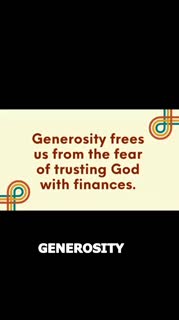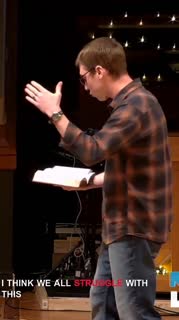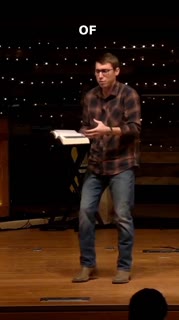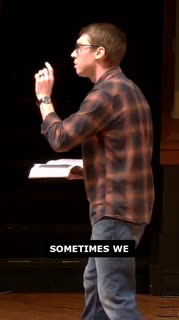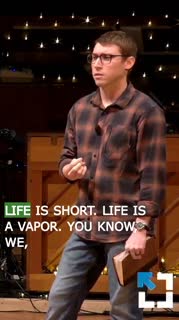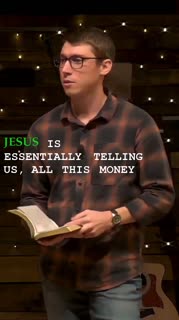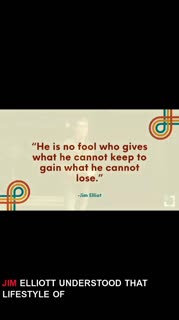Embracing Generosity: Trusting God with Our Finances
Devotional
Sermon Summary
Bible Study Guide
Sermon Clips
1. "Generosity frees us from the fear of trusting God with finances. And to be honest with you, I'm a little embarrassed because as I prepared for this message and did the research and read over the passage and read over it again and again and prayed through it and discussed with Pastor Craig different topics and different ideas, I started to realize that I struggle with generosity and I struggle with this fear of trusting God with finances." [39:17] (25 seconds)
2. "I think we all struggle with this sometimes, living a life of generosity and trusting God with finances. I think we can all relate to that conflict, where you see the shiny thing. You're like, man, that's really cool. You think, I probably should pray through this. Maybe I should talk to God about this. Maybe I should consider my options. But then you also see that shiny thing. Maybe it's the new car, the new phone. And you think, wow, you know, I haven't typed yet. And you think, yeah, you know, God, I'll get you next week, right?" [40:11] (27 seconds)
3. "The very presence of money in our lives creates this opportunity for sin to step in, for fear to step in, and we don't want to take that step of faith. This fear attaches itself to our hearts as a heartstring, and that's the heartstring for this week that we're talking about is fearfulness. And you know, Jesus knew we were going to struggle with this." [41:48] (18 seconds)
4. "Sometimes we fear trusting God with our finances because we have an inaccurate perception of who he is. We don't think we can trust him with our finances. We don't think we can trust him with our resources. And maybe it's not a question. Maybe it's not a quick thing. Maybe it's not a, I'm not going to trust you this month, God. Maybe it's a quiet thing." [48:12] (17 seconds)
5. "Life is short. Life is a vapor. You know, we, that's why I'm telling you this story, because I want to remind you that we're not guaranteed tomorrow. We're not guaranteed to get home. We're not guaranteed to see next year. As much as you may love your kids and your family, you are not guaranteed to see them grow up." [49:49] (22 seconds)
6. "Jesus is essentially telling us, all this money you have should be invested in these eternal souls, these relationships you have. Because money will fail. This money we have, this dollar, the stock market could crash, and our dollar becomes useless. And now it's no longer reliable. And even further, any amount of money you think you have on this earth, we're not keeping." [56:33] (27 seconds)
7. "This is about living a lifestyle of radical generosity. This is about saying, you know, God, I'm going to trust you in everything you do. I'm going to trust you with my whole life, even my money, even my health, even my relationships. With everything I have, I'm going to trust you." [57:19] (13 seconds)
8. "Jim Elliott understood that lifestyle of generosity. Jim Elliott understood that it was a daily sacrifice. It wasn't just a one-time thing. If you've ever read Mere Christianity by C. S. Lewis, when he talks about generosity, he says, you should feel it. You should be so generous that it limits what you can do." [01:02:16] (20 seconds)
Ask a question about this sermon
2. "I think we all struggle with this sometimes, living a life of generosity and trusting God with finances. I think we can all relate to that conflict, where you see the shiny thing. You're like, man, that's really cool. You think, I probably should pray through this. Maybe I should talk to God about this. Maybe I should consider my options. But then you also see that shiny thing. Maybe it's the new car, the new phone. And you think, wow, you know, I haven't typed yet. And you think, yeah, you know, God, I'll get you next week, right?" [40:11] (27 seconds)
3. "The very presence of money in our lives creates this opportunity for sin to step in, for fear to step in, and we don't want to take that step of faith. This fear attaches itself to our hearts as a heartstring, and that's the heartstring for this week that we're talking about is fearfulness. And you know, Jesus knew we were going to struggle with this." [41:48] (18 seconds)
4. "Sometimes we fear trusting God with our finances because we have an inaccurate perception of who he is. We don't think we can trust him with our finances. We don't think we can trust him with our resources. And maybe it's not a question. Maybe it's not a quick thing. Maybe it's not a, I'm not going to trust you this month, God. Maybe it's a quiet thing." [48:12] (17 seconds)
5. "Life is short. Life is a vapor. You know, we, that's why I'm telling you this story, because I want to remind you that we're not guaranteed tomorrow. We're not guaranteed to get home. We're not guaranteed to see next year. As much as you may love your kids and your family, you are not guaranteed to see them grow up." [49:49] (22 seconds)
6. "Jesus is essentially telling us, all this money you have should be invested in these eternal souls, these relationships you have. Because money will fail. This money we have, this dollar, the stock market could crash, and our dollar becomes useless. And now it's no longer reliable. And even further, any amount of money you think you have on this earth, we're not keeping." [56:33] (27 seconds)
7. "This is about living a lifestyle of radical generosity. This is about saying, you know, God, I'm going to trust you in everything you do. I'm going to trust you with my whole life, even my money, even my health, even my relationships. With everything I have, I'm going to trust you." [57:19] (13 seconds)
8. "Jim Elliott understood that lifestyle of generosity. Jim Elliott understood that it was a daily sacrifice. It wasn't just a one-time thing. If you've ever read Mere Christianity by C. S. Lewis, when he talks about generosity, he says, you should feel it. You should be so generous that it limits what you can do." [01:02:16] (20 seconds)
